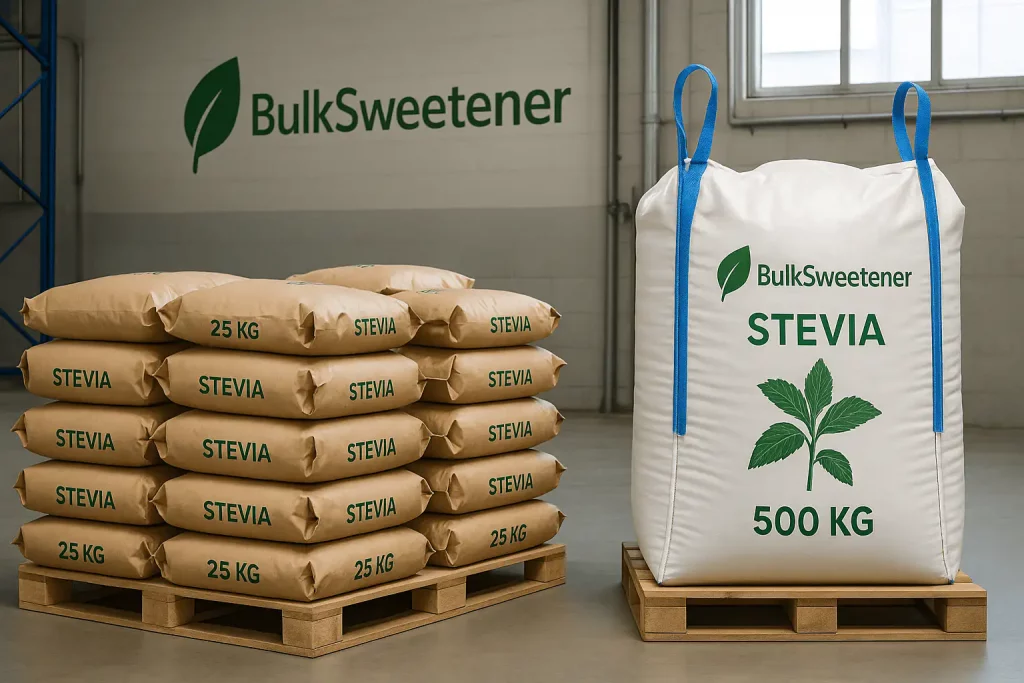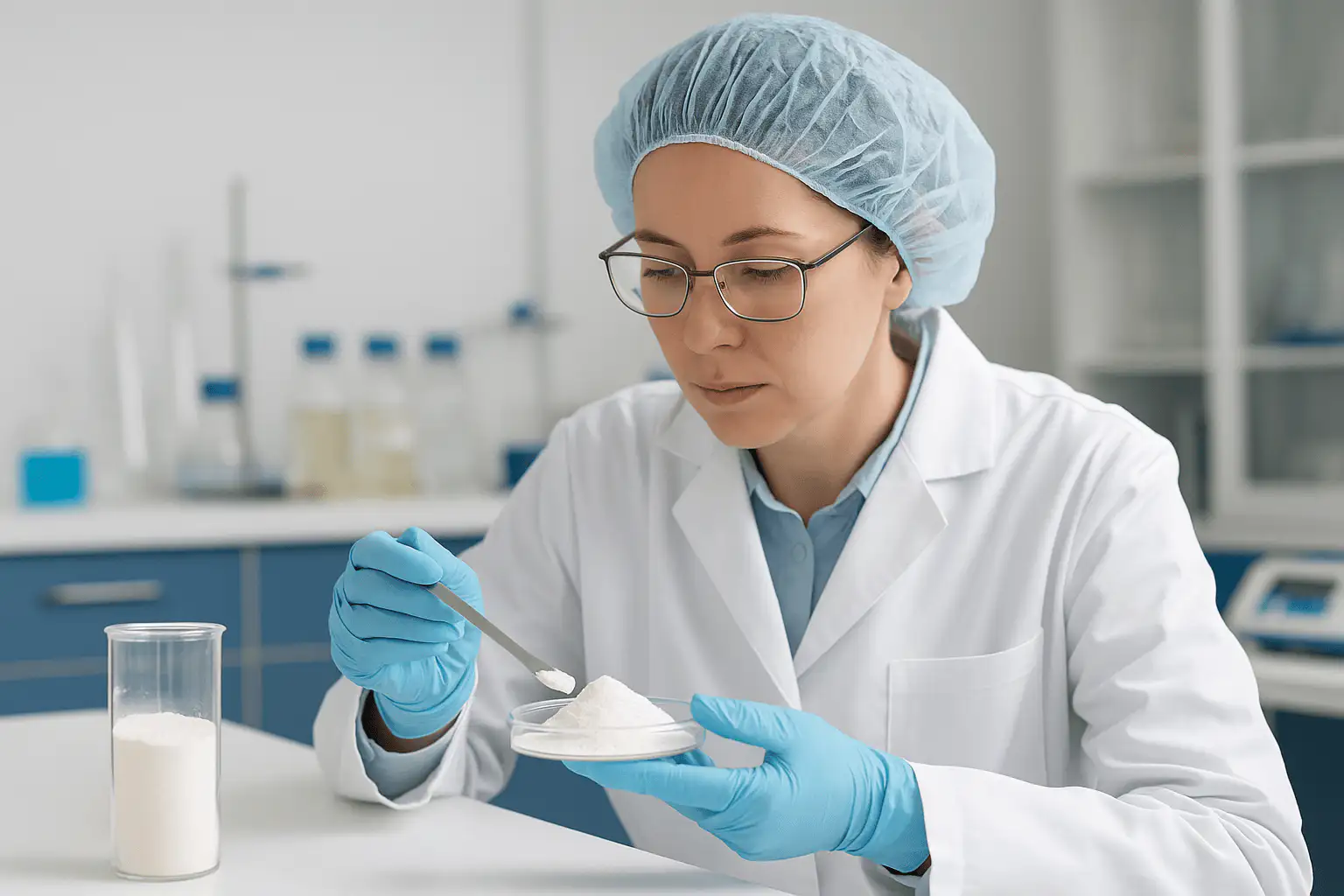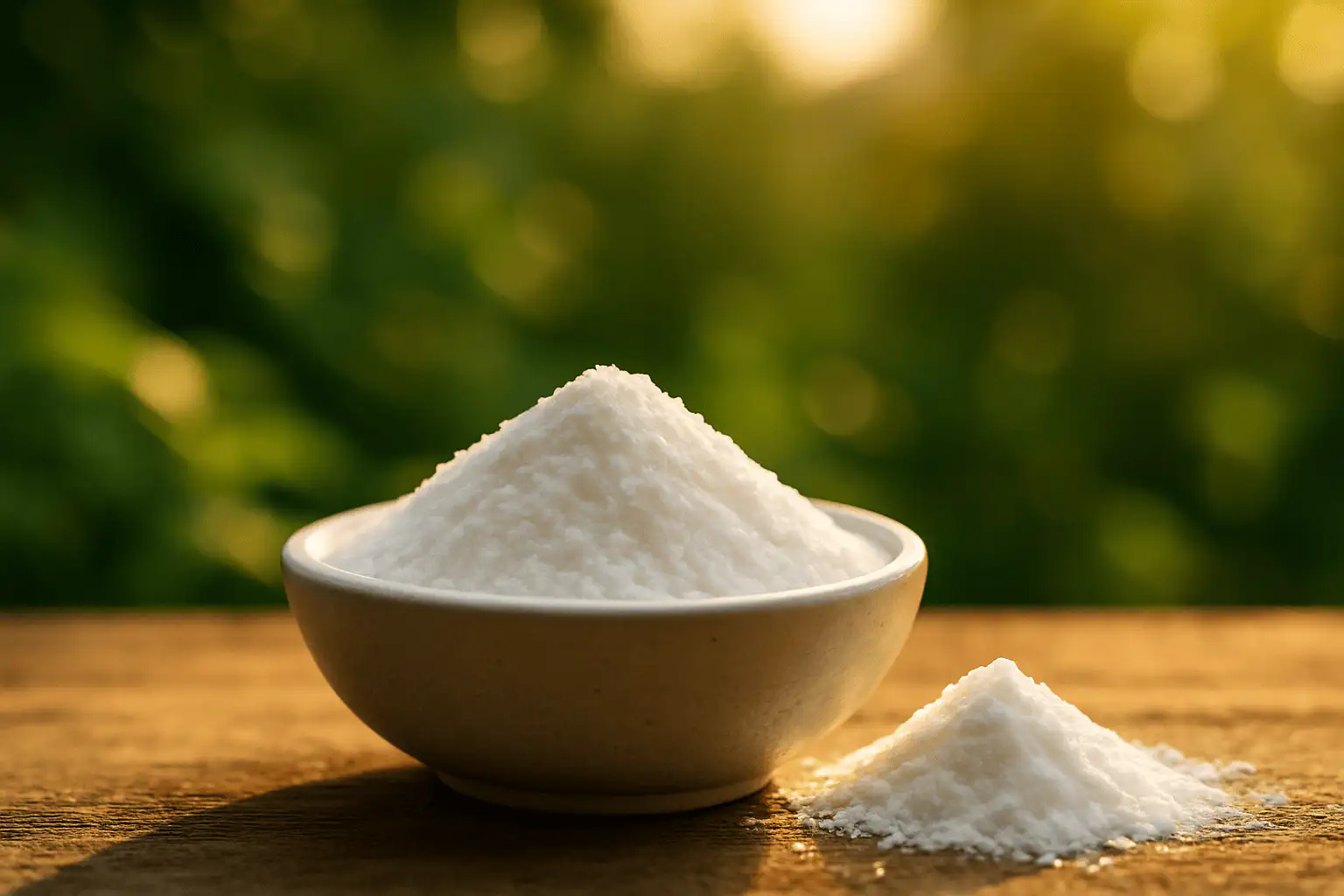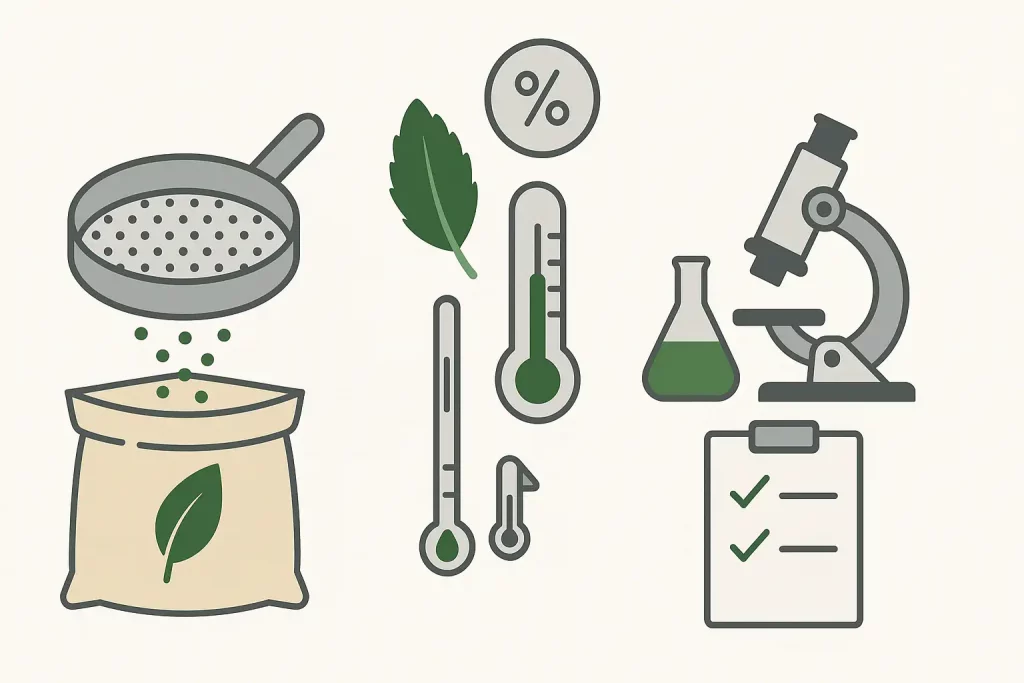Bulk stevia for industry: consistent quality and reliable supply
If you’re comparing bulk stevia options—best stevia bulk, stevia bulk wholesale, stevia extract bulk (including Reb A stevia bulk ), organic stevia powder bulk, or stevia erythritol blend bulk—we supply stable lots with documented specs. Choose bulk stevia powder, bulk stevia extract powder, or stevia liquid sweetener bulk with consistent PSD, moisture, and sweetness. Ask for stevia bulk price by grade (Reb A 60–97) or blends (erythritol + stevia). COA/TDS provided per lot. EU/LATAM deliveries with industrial support.


Formulation Tech Support

Competitive Prices

Natural Taste

Full batch traceability
The risks of buying bulk stevia without standards
- Sweetness variability and PSD drift between lots
- Moisture issues leading to caking or flow problems
- Irregular dissolution and visible specks in beverages
We qualify leaf sources and extract grades, control PSD via calibrated sieving, and monitor moisture to a defined spec. Each lot is QC-checked for steviol glycosides profile (e.g., Reb A), sensory panel validated, and released with COA/TDS. Result: predictable sweetness, clean dissolution, and fewer reworks

Key Technical Specifications — Bulk Stevia
| Category | Specification | Details |
|---|---|---|
| Chemistry | Purity (steviol glycosides) | ≥95% (JECFA) — options up to Reb A 97 |
| Relative sweetness (vs sucrose) | 200–300× (grade-dependent) | |
| pH (aqueous solution) | Typically 4.5–7.0 (method-dependent) | |
| Moisture (loss on drying) | ≤4.0% (typical ≤3.0%) | |
| Physical | PSD / mesh | 80–200 mesh (customizable per application) |
| Bulk density (tamped) | 0.35–0.55 g/mL | |
| Solubility in water (20 °C) | Fully soluble; fast-dissolving grade available | |
| Stability | Thermal | Stable in baking up to ~200 °C (time-dependent) |
| pH range | Functional from ~pH 3–9 | |
| Hygroscopicity | Low to moderate; store below 60% RH | |
| Quality | Allergens | None expected (per spec) |
| GMO | Non-GMO options available | |
| Heavy metals | Compliant with food-grade limits | |
| Origin | Leaf-derived; sourcing programs in Americas/Asia | |
| Documents | COA, TDS, MSDS available on request | |
Key Technical Specifications — Bulk Stevia
| Category | Specification | Details |
|---|---|---|
| Chemistry | Purity (steviol glycosides) | ≥95% (JECFA) — options up to Reb A 97 |
| Relative sweetness (vs sucrose) | 200–300× (grade-dependent) | |
| pH (aqueous solution) | Typically 4.5–7.0 (method-dependent) | |
| Moisture (loss on drying) | ≤4.0% (typical ≤3.0%) | |
| Physical | PSD / mesh | 80–200 mesh (customizable per application) |
| Bulk density (tamped) | 0.35–0.55 g/mL | |
| Solubility in water (20 °C) | Fully soluble; fast-dissolving grade available | |
| Stability | Thermal | Stable in baking up to ~200 °C (time-dependent) |
| pH range | Functional from ~pH 3–9 | |
| Hygroscopicity | Low to moderate; store below 60% RH | |
| Quality | Allergens | None expected (per spec) |
| GMO | Non-GMO options available | |
| Heavy metals | Compliant with food-grade limits | |
| Origin | Leaf-derived; sourcing programs in Americas/Asia | |
| Documents | COA, TDS, MSDS available on request | |
Client testimonials and reviews
Bara Ezquerra
At Bara Ezquerra we work with Bulksweetener for our stevia, and the quality is excellent: clean taste, no aftertaste, and very consistent. We pack it in sticks for our HORECA clients and they’re very happy; they reorder and appreciate the presentation and product consistency.
Cacao Delta
After testing several options, Cacao Delta chose Bulksweetener’s stevia blend: balanced sweetness that preserves the cocoa notes. It performs beautifully in tempering, baking, and fillings, with no recrystallization or aftertaste. It’s the perfect solution for our bars and bonbons.
Acasyna
For our jams, Bulksweetener’s stevia blend works beautifully: it sweetens without masking the fruit and keeps a uniform consistency even after months in storage. No syneresis, no crystallization, and a clean taste. At Acasyna, we’re very satisfied.
Oroyes
As a food distributor, Oroyes brings Bulksweetener sweeteners to the retail channel and the brand practically sells itself: it’s well-known, trusted, and moves quickly on shelves. Product quality is consistent, and our customers reorder it regularly.
Frequently Asked Questions — Bulk Stevia
What is the typical sweetness level of stevia?
Purified steviol glycosides (e.g., Reb A) are roughly 200–300× sweeter than sucrose on a weight basis. The exact factor varies by glycoside type, purity, matrix, and temperature. At very low use levels, sweetness is clean; at higher levels, some people perceive herbal or lingering notes, which formulators often smooth with taste modulators or blends.
What does “Reb A” mean?
Rebaudioside A (Reb A) is one of the main sweet molecules in Stevia rebaudiana. Extracts are often labeled by their Reb A content (e.g., Reb A 60–97). Higher Reb A grades generally taste cleaner and less bitter than lower grades at the same sweetness, though other glycosides (Reb D/M) can further improve taste in some applications.
How is stevia used in industrial formulations?
Stevia is used in beverages, dairy, bakery, confectionery, RTD and tabletop. Because it is high-intensity, usage levels are typically 0.02–0.2% depending on product and grade. In reduced-sugar foods, it’s often paired with bulk sweeteners (e.g., erythritol, allulose) and flavor systems to rebuild mouthfeel and temporal profile.
Does stevia dissolve easily in liquids?
Steviol glycosides are water-soluble and disperse readily. Finer PSD (higher mesh) can speed dissolution and reduce specking in cold beverages. Agitation and pre-mixing into a syrup or dry premix further improves handling in plant conditions.
Is stevia stable when heated or baked?
Steviol glycosides are thermally stable under typical food processes (pasteurization, UHT, most baking). In baking, sweetness is largely retained; any losses are usually minor and time/temperature dependent. Stevia is also stable across about pH 3–9, which covers most beverage and dairy systems.
Is stevia suitable for keto or diabetic products?
Yes. Stevia provides negligible calories and no digestible carbohydrates, so it has no meaningful glycemic impact at normal use levels. Always check the full formula: carriers or bulking agents (e.g., maltodextrin) can change nutritional values.
What are the main physical characteristics of stevia powder?
Food-grade extract is a white to off-white, fine powder, neutral in odor, low to moderately hygroscopic. Typical bulk density is ~0.35–0.55 g/mL depending on grade and milling. Store sealed to prevent moisture pickup and caking.
Does stevia contain allergens or gluten?
Stevia extract is plant-derived and naturally gluten-free. It is not among major food allergens identified in common regulatory lists. Final allergen status depends on the facility and any carriers used in specific products.
Is stevia GMO-free?
Leaf-derived stevia extracts are generally considered non-GMO. Some newer steviol glycosides are produced via fermentation with engineered microbes; the purified end product does not contain the organism or its DNA, but GMO labeling rules vary by country. Check the specification and local regulations.
Pure extract vs. blends—what’s the difference?
Pure stevia extract delivers high sweetness with minimal volume. Blends (e.g., stevia + erythritol or allulose) add bulk, improved mouthfeel, and smoother sweetness curves, which is helpful in sugar-reduced foods and beverages.
